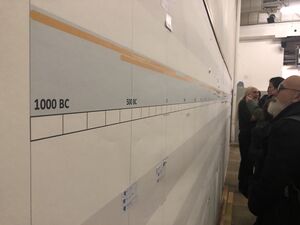Difference between revisions of "Methodologies"
| (2 intermediate revisions by 2 users not shown) | |||
| Line 5: | Line 5: | ||
Above all, like any cuisine, the recipes here offer a means to get to know the people and cultures they come from, nourishing our sense of who we are today and how we want to shape our tomorrow. So, whether you cook for yourself, for others or only in your imagination, we hope our cookbook will enable you to relish a taste of technical theatre’s nutritious past! | Above all, like any cuisine, the recipes here offer a means to get to know the people and cultures they come from, nourishing our sense of who we are today and how we want to shape our tomorrow. So, whether you cook for yourself, for others or only in your imagination, we hope our cookbook will enable you to relish a taste of technical theatre’s nutritious past! | ||
| + | |||
| + | [https://canonbase.eu/w/images/b/b9/Canon_Teaching_Methodologies.pdf Download the Cookbook in pdf] | ||
| + | |||
| + | Buy a physical copy of the Cookbook from the [https://www.thegreatbritishbookshop.co.uk/products/the-canon-cookbook-recipes-for-learning-and-teaching-the-history-of-technical-theatre?_pos=2&_sid=f5d9165f3&_ss=r Great British Bookshop] (including international sales). | ||
The methodologies are organised by subject: | The methodologies are organised by subject: | ||
| Line 35: | Line 39: | ||
* [[Item:Q31020|Making a Linnebach Projector]] | * [[Item:Q31020|Making a Linnebach Projector]] | ||
* [[Item:Q31021|Making a Miniature Demonstration of Pepper’s Ghost]] | * [[Item:Q31021|Making a Miniature Demonstration of Pepper’s Ghost]] | ||
| − | * [[Item:Q31022|Discovering Lighting Control]] | + | * [[Item:Q31022|Discovering Lighting Control with Virtual Grand Master]] |
=== [[Item:Q54|Sound]] === | === [[Item:Q54|Sound]] === | ||
Latest revision as of 09:56, 12 April 2023
The Canon teaching methodologies together form a ‘cookbook’ for teaching and learning about the history of technical theatre. Each ‘recipe’ in the cookbook describes a learning activity. Some methodologies are specific to a particular field, such as architecture, or lighting, while others can be used to learn about any aspect of technical theatre. Each methodology describes the process, the resources needed and the preparation required, as well as indicating the type of student it is intended for, the kind of learning process it is, and how long it will take. We also offer some tips and advice, based on our experience as ‘chefs’.
As with any cookbook, we invite you to create your own preferred variations. If you are cooking for more or fewer guests, just for yourself or for a small army, if you just want a snack or need to prepare a banquet, please feel free to adapt the recipes we have included here. The tastes offered by the history of technical theatre can be aromatic, spicy, rich, sweet or delicate, homely or exotically unfamiliar. They can feed not only a technological understanding, but also our imagination about what theatre can be, how it can be made, and what effect it can have in the world.
Above all, like any cuisine, the recipes here offer a means to get to know the people and cultures they come from, nourishing our sense of who we are today and how we want to shape our tomorrow. So, whether you cook for yourself, for others or only in your imagination, we hope our cookbook will enable you to relish a taste of technical theatre’s nutritious past!
Buy a physical copy of the Cookbook from the Great British Bookshop (including international sales).
The methodologies are organised by subject:
Contents
Suitable for All Subject Areas
- Getting to Know You Postcard Project
- Teaching Theatre History On Location
- Making a Dictionary of Key Terms
- Learning Theatre Words in Other Languages
- Technical Theatre Quiz
- Making Oral History Interviews
- From Text to Theatre: staging the dialogues of Leone de’ Sommi
- Building a Timeline of Technical Theatre History
- Anno Teatri: the History Game of Technical Theatre
Architecture
- Design Your Own Theatre from a Kit
- Comparing Theatre Architectures by Drawing and Writing
- From Text to Drawing: modelling Sabbatini’s theatre
- Gingerbread Theatre
Lighting and Projection
- Workshop to Create a Candlelit Miniature Theatre Performance
- Making a Room-sized Camera Obscura
- Making a Miniature Camera Obscura
- Making a Salt Water Dimmer
- Making a Linnebach Projector
- Making a Miniature Demonstration of Pepper’s Ghost
- Discovering Lighting Control with Virtual Grand Master
Sound
Scenography
- Exploring Historic Scenographies through 3D modelling
- Investigating Accelerated Perspective Using Serlio’s Scenes
- Painted Scenery Using Rabbit Glue and Canvas
- Workshop to build a scenography for de’ Sommi’s dialogues
Stage Mechanics and Sets
- Five Laboratory Exercises with Rope, Block and Tackle
- Baroque Elevator Workshop
- Discovering Scenotechnic Movements
- Making One-to-Four Scale Models of Baroque Stage Machinery
- - -
Methodology example page - use the wiki mark-up from this page as a template for making new learning methods.
